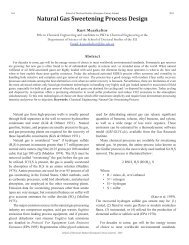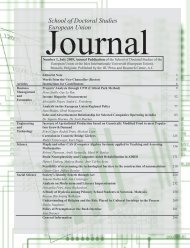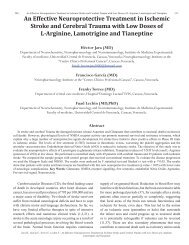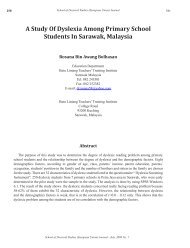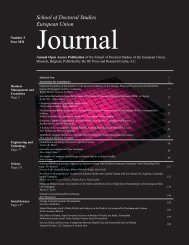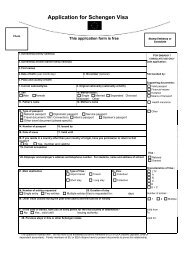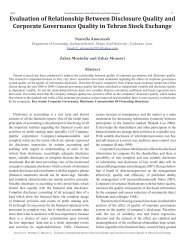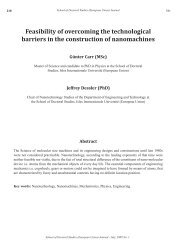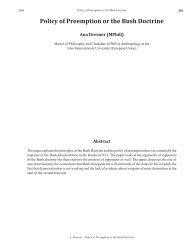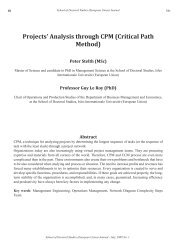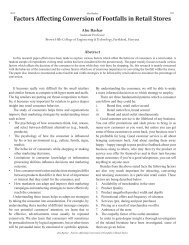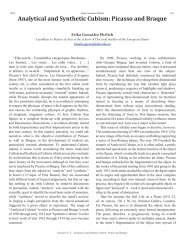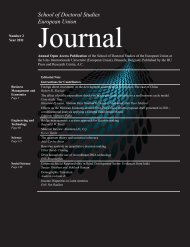Iiuedu.eu
Iiuedu.eu
Iiuedu.eu
You also want an ePaper? Increase the reach of your titles
YUMPU automatically turns print PDFs into web optimized ePapers that Google loves.
20 School of Doctoral Studies (European Union) Journal 2011IFRS adoption in that evidence support the fact that wherefirms are expected to apply the same accounting standards,differences in reporting practices have been observed acrossfirms and countries (Burgstahler et al. 2006 and Lang et al.2006).The above exposition suggests that mandatoryaccounting rules and regulations such as the IFRS cannot beconsidered in isolation of other relevant institutions becauseits (IFRS) effectiveness will depend on the understandingof the economic and institutional factors that affect firmsreporting incentives (Ball, 2001).Research MethodsThis is a descriptive study in which questionnaire wasused to elicit data in order to determine the perceptionof compilers and users of annual reports on the state ofinstitutional infrastructure for the adoption of IFRS inNigeria. Finance managers represented the compilersbecause they are deemed to be knowledgeable about IFRSand could provide a preparer’s perspective on its adoption.Similarly, Investment analysts represent the users basedon a number of reasons identified in extant literature. Forinstance, Investment analysts are identified in the literatureas the principal users of financial reports (Paudyal andRees, 2000; Healy and Palepu, 2001; Clement and Tse,2003; Mangena, 2004) because their work requires thatthey have the accounting knowledge to enable them toanalyze the reports and make decisions (Baker, 1998).Thus, it is believed that provision of information that meetsthe needs of the analysts is considered as also meetingmost of the needs of other users (Gebhardt, Reighardt, andWittenbrinck, 2004).The questionnaire was administered to a total of 203compilers who met the conditions specified below- Thefirm in which they are employed is listed and active on theNigerian Stock Exchange in the last ten years i.e (between1990 and December, 2009) and the industry that the firmsbelong has at-least three firms. Also, the questionnaire wasadministered to each of the Principal Analysts of the twohundred and twenty five (225) investment analyst firmsidentified from the list of Capital Market Operators compiledby the Nigerian Stock Exchange. All the investment analystfirms were included in the sample because, as observed byMangena (2004:34), the response rate among investmentanalysts is usually low.The questions required the respondents to answer ona five-point Likert scale anchored by (5) indicating verystrong and (1) very weak. Similar scales have been usedby Firer and Meth (1986), Courtis (1992) and Myburgh(2001) and were found suitable. A total number of 125questionnaires were returned by the compilers out of which106 were useable. For the users, 98 questionnaires werereturned out of which 75, were found useable.Survey Results and DiscussionThe results presented in the table below are based onthe authors’ field survey in 2010. The first question probedthe readiness of the professional accounting bodies to meetthe challenges posed by the adoption of IFRS in five areasshown in the table. The results for this question are shownin Table 1.Table 1 Professional Accounting Bodies (ICAN and ANAN)The results presented in the above table indicate that theeducation and training of accountants by the professionalaccounting bodies will have strong implications forIFRS. This is closely followed by the yearly productionof professional accountants with a mean of 3.59 from thecompilers’ point of view and professional ethics from theview point of users. These issues are important for thesuccessful adoption of IFRS. Based on the results above,it can be inferred that on the average, the accountingbodies have the capacity to cope with the demands of IFRSadoption.The second question probed the readiness of CBN tocope under IRFS dispensation based on its antecedents interms of the matters listed in table 2 below.1 Submission of audited financial statementsby banksCompilersn=106Compilersn=106Usersn=75Mean Rank Mean Rank1 Average yearly production of accountants 3.59 2 3.10 42 Mandatory Continuing ProfessionalEducation (MCPE)3.62 1 3.58 13 Professional ethics 3.39 3 3.46 24 Discipline of members 3.39 3 3.26 35 Service to the public and government 3.37 5 2.68 5Table 2 Central Bank of Nigeria (CBN)Usersn=75Mean Rank Mean Rank3.60 1 3.70 1School of Doctoral Studies (European Union) Journal - 2011



